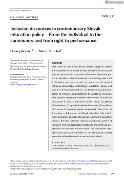Inclusion discourses in contemporary Slovak education policy – From the individual to the community and from right to performance

Publication date
2023Published in
European Journal of EducationVolume / Issue
2023/58 (2)ISBN / ISSN
ISSN: 0141-8211ISBN / ISSN
eISSN: 1465-3435Metadata
Show full item recordCollections
This publication has a published version with DOI 10.1111/ejed.12556
Abstract
The study on which this article reports sought to explain the complexity of the relationship between inclusion policies and practices in education in Slovakia. Education policy in Slovakia is characterised by an enduring resistance to inclusion practices, despite the presence of humanist inclusion discourses. Accordingly, education policy and practices in Slovakia manifest a conflicting or parallel application of humanist and neoliberal discourses on inclusion. The analysis presented identifies three types of inclusion discourses in Slovak education policy today: (1) general individualised, (2) specified individualised, and (3) neoliberal discourses. Concrete examples are provided of each of the three types of discourses in Slovak education policy, to illustrate specific educational policies in different education sectors. Specific national challenges related to notions of inclusion and the associated paradoxes and differing perceptions of inclusion are discussed. The conclusion highlights the question of whether a truly democratic society can exist without humanistic and inclusive ideals.
Keywords
critical policy analysis, discourses on inclusion, European Union, inclusive education, Slovakia
Permanent link
https://hdl.handle.net/20.500.14178/2879License
Full text of this result is licensed under: Creative Commons Uveďte původ-Neužívejte dílo komerčně-Nezpracovávejte 4.0 International





